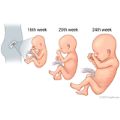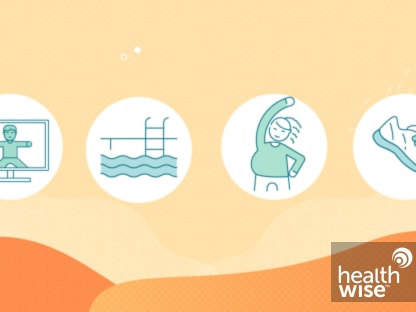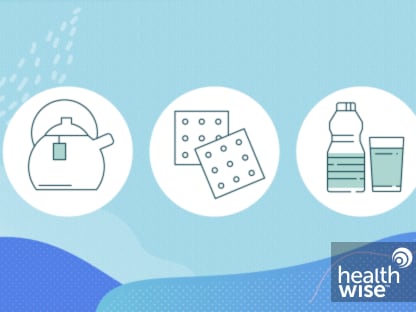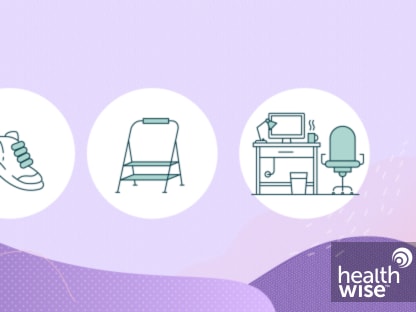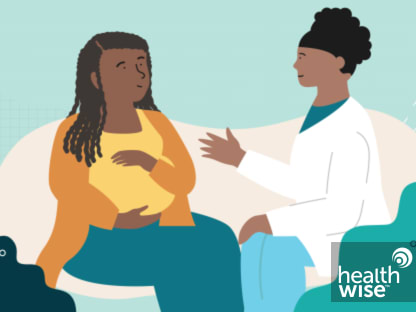Pregnancy
Overview
As soon as you think you might be pregnant, visit your doctor or midwife. Your health in the early weeks of your pregnancy is particularly important.
During your pregnancy, you'll have regular checkups. These prenatal visits can help you have a safe and healthy pregnancy. Your doctor or midwife is watching for problems that can be found through these office visits.
At different times in your pregnancy, you will have exams and tests. Some are routine. Others are done only when there is a chance of a problem.
Your body will go through many changes during each trimester of pregnancy. So rest when you need it, ask for help from friends and family, and eat well.
What changes can you expect in your body?
Pregnancy changes can be different for every person and every pregnancy. Some of the most common changes during the first 13 weeks include feeling tired, feeling sick to your stomach, and having tender breasts. It's also common to need to urinate more often.
As you move into your second trimester (weeks 14 to 27), you may start to look pregnant. You may notice some differences in how you feel. You might feel less sick to your stomach and have more energy. And you may not have to urinate as often.
The third trimester lasts from week 28 to the birth. You may have some discomfort during this time. You may feel tired and have discomfort in many parts of your body. You may have trouble breathing and problems getting comfortable so you can sleep.
How can you cope with changes in your emotions?
When you're pregnant, hormone changes can affect your emotions and how you feel. It's important to take care of yourself. Ask family and friends for support. Let them know how you're doing. Spend time doing things you enjoy, and find ways to manage stress. If you're overwhelmed, talk to your doctor or a counselor.
What can you do to have a healthy pregnancy?
Taking great care of yourself is the best thing you can do to have a healthy pregnancy. Everything healthy that you do helps.
- Get regular checkups.
-
They are an important part of a healthy pregnancy. Your doctor or midwife will weigh you and measure your belly. You'll also have tests to watch for problems that could occur.
- Eat healthy foods.
-
Choose foods like fruits, vegetables, whole grains, lean proteins, low-fat dairy, and healthy fats.
- Get regular exercise.
-
Drink plenty of water before, during, and after you're active, especially when it's hot out.
- Get plenty of rest.
-
Go to bed earlier than usual and get up later, if you can. Take naps, unless napping makes you sleepless at night.
- Avoid things that could be harmful.
-
This includes tobacco, vaping, marijuana and other drugs, alcohol, strong chemicals, radiation (like X-rays), and risky sports.
Health Tools
Health Tools help you make wise health decisions or take action to improve your health.
Prenatal Visits and Tests
Regular prenatal visits are very important during any pregnancy. These quick office visits may seem simple and routine. But they can help you have a safe and healthy pregnancy. Your doctor is watching for problems that can only be found through regular checkups. The visits also give you and your doctor time to build a good relationship.
After your first visit, you will most likely start on a schedule of monthly visits. In your third trimester, the visits will get more frequent. Based on your health, your age, and if you've had a normal, full-term pregnancy before, your doctor may want to see you more or less often.
At different times in your pregnancy, you will have exams and tests. Some are routine. Others are done only when there is a chance of a problem. Everything healthy you do for your body helps you have a healthy pregnancy. Rest when you need it. Eat well, drink plenty of water, and exercise regularly.
Your first prenatal visit
At your first prenatal visit, your doctor or midwife will ask about your medical history and figure out your due date. You'll have a complete physical exam. You may also have some tests. This will provide information that can be used to check for any problems as your pregnancy progresses.
First-trimester exams and tests
At each visit in your first trimester, you'll be weighed and have your blood pressure checked. You may also have a urine test. You can choose whether to have tests for birth defects. And your doctor or midwife may ask questions about your health and emotions.
Second-trimester exams and tests
At each visit in the second trimester, you'll be weighed and have your blood pressure checked. You may also have urine and blood tests. Your doctor or midwife will listen to your baby's heartbeat and track your baby's growth and position. And you may be asked about birth defect testing and how you feel emotionally.
Third-trimester exams and tests
At each visit in the third trimester, you'll be weighed, and your blood pressure and urine will be checked. Your doctor or midwife will track your baby's growth and position and see whether your baby is head-down. Your doctor may suggest other tests and ask how you feel emotionally.
Learn more
Watch
Testing for Birth Defects
Birth defects testing may be done during pregnancy to look for possible problems with the baby. Birth defects include:
- Chromosome, Opens dialog defects, such as Down syndrome, Opens dialog and trisomy 18, Opens dialog.
- Diseases that can be passed down in families, such as Tay-Sachs disease, Opens dialog and sickle cell disease, Opens dialog.
- Problems with the structure of an organ, including heart defects and neural tube defects, Opens dialog.
There are two types of birth defects tests.
- Screening tests.
-
These are blood tests and ultrasounds. These tests show the chance that a baby has certain birth defects.
- Diagnostic tests.
-
These tests involve taking some of the baby's cells to look at the genes and chromosomes. They can show if a baby has certain birth defects.
Your doctor can tell you which tests are available and which ones might be best for you. You may want to talk with a genetic counselor, who can discuss the reasons to have or not have a test.
Learn more
Health and Nutrition
Taking care of yourself is the best thing you can do to have a healthy pregnancy. Get regular checkups, and eat a variety of healthy foods. Try to get regular exercise and plenty of rest. And avoid things that could be harmful, including smoking, vaping, drinking alcohol, and using marijuana or other drugs.
Get the nutrition you need
Your nutrition needs increase during pregnancy. Your body needs protein, Opens dialog, carbohydrate, Opens dialog, and fats for energy. Good sources of these nutrients include:
- Lean protein. Examples include fish that are low in mercury, poultry without skin, low-fat milk products, and beans and peas (legumes). Fish that are low in mercury include shrimp, salmon, and catfish.
- Carbohydrate from whole grains, fruits, vegetables, legumes (peas, beans, and lentils), and low-fat milk products.
- Unsaturated fats like olive oil and canola oil, nuts, and fish.
Important vitamins and minerals during pregnancy include:
- Calcium.
-
Calcium, Opens dialog is found in dairy products and nonmilk sources such as tofu, broccoli, fortified orange juice or soy milk, and greens.
- Folic acid.
-
Folic acid, Opens dialog (or folate) is found in foods such as liver, vegetables (especially spinach, asparagus, and brussels sprouts), fruits (such as bananas and oranges), and beans and peas. Enriched products such as cereal, bread, pasta, and rice are also good sources.
- Iron.
-
Iron is found in foods such as red meat, shellfish, poultry, eggs, nuts, beans, raisins, whole-grain bread, and leafy green vegetables.
Even if you have good eating habits, your doctor may suggest a multivitamin to make sure you get enough iron and folic acid.
Be active
Exercise is good for you during a healthy pregnancy. It can help relieve back pain, swelling, and other discomforts. Exercise also prepares your muscles for childbirth. And it can improve your energy level and help you sleep better.
Activities that are recommended include:
- Moderate exercise, Opens dialog such as brisk walking or swimming. Try to do at least 2½ hours of moderate activity a week. One way to do this is to be active 30 minutes a day, at least 5 days a week. It's fine to be active in shorter periods of time throughout your day and week that add up to the recommended goals.
- Stretching and strengthening exercises, such as forward bends and pelvic tilts. Try a prenatal exercise class, such as prenatal yoga. Avoid hot yoga, such as Bikram yoga. It may make your body temperature too high.
- Kegel exercises. These exercises strengthen your pelvic floor muscles, Opens dialog. They may help prevent urine leaks (incontinence) after childbirth.
Moderate exercise is safe for most pregnancies. But if you don't already exercise, be sure to talk with your doctor before you start a new exercise program.
If you exercised before getting pregnant, you should be able to stay with your same routine early in your pregnancy. Later in your pregnancy, you may want to switch to more gentle activities.
Learn more
Watch
Dos and Don'ts of Pregnancy
What things to avoid when you're pregnant
When you're pregnant, there's a lot to learn about what's safe and what to avoid. Some things to try to avoid include:
-
Fish high in mercury.
- These include shark, swordfish, king mackerel, marlin, orange roughy, and bigeye tuna, as well as tilefish from the Gulf of Mexico.
- It's okay to eat up to 8 to 12 ounces a week of fish that are low in mercury or up to 4 ounces a week of fish that have medium levels of mercury. Some fish that are low in mercury are salmon, shrimp, canned light tuna, cod, and tilapia. Some fish that have medium levels of mercury are halibut and white albacore tuna.
- For more advice about eating fish, you can visit the U.S. Food and Drug Administration (FDA) or U.S. Environmental Protection Agency (EPA) website.
- Raw (unpasteurized) milk and cheeses made with raw milk. Cheeses usually made with unpasteurized milk include feta, Brie, Camembert, blue cheeses, and Mexican-style cheeses such as queso blanco.
- Alcohol and drugs. If you use alcohol, marijuana, or other drugs, quit or cut back as much as you can. It's safest not to use them at all. Talk to your doctor if you need help to quit.
-
Caffeine.
- Limit caffeine to about 200 to 300 mg per day. On average a cup of brewed coffee has around 80 to 100 mg of caffeine.
- Be aware that many soft drinks, energy drinks, and chocolate have caffeine.
- Tobacco smoke and vaping. They contain harmful chemicals such as nicotine and carbon monoxide. Talk to your doctor if you need help quitting.
- Things that can make your body too hot, such as hot tubs or saunas. High body temperature can be harmful. Talk with your doctor before using them. Your doctor can tell you if it's safe.
- Risky activities. These include things like horseback or motorcycle riding, water-skiing, scuba diving, and exercising at a high altitude (above 6,000 feet). If you live in a place with a high altitude, talk to your doctor about how you can exercise safely.
-
Sources of food poisoning. These include:
- Raw or undercooked meat or seafood.
- Unpasteurized juice and milk.
- Soft cheese and cheese made with unpasteurized milk.
- Premade deli salads such as egg, pasta, and chicken salad.
- Hot dogs and deli meats that haven't been heated to steaming.
- Raw sprouts.
- Undercooked eggs.
- Unwashed fresh fruits and vegetables.
- Cat poop, cat litter, or outdoor soil that cats use. These things can cause an infection that could be harmful.
- Medicines that are not approved by your doctor or midwife. These include over-the-counter medicines, vitamins, and supplements.
-
Lead, radiation, and strong chemicals.
- Strong chemicals include pesticides, household cleaners, and paint.
- Make changes at work or home to avoid these substances. If you can't, wear personal protective equipment (PPE) such as a mask, gloves, and goggles.
What's okay when you're pregnant
Going to work or school while pregnant is usually safe. If you aren't having any problems with your pregnancy, you can probably keep going until you go into labor. But if you have to be very active or do things like stand or walk a lot, talk with your doctor or midwife.
Having sex during pregnancy is okay, unless your doctor tells you not to. But how sexy you feel may be a bit different than in the past. Pregnancy may be a chance to explore new ways to feel close, new sexual positions, and new ways to communicate.
Travel during pregnancy generally is safe if you're healthy and not at risk for problems. The safest time to travel is between 14 and 28 weeks, when your risks for miscarriage and early labor are lowest. Check with your doctor before you travel.
Learn more
- Acetaminophen Use During Pregnancy
- Alcohol or Drug Use During Pregnancy
- Avoiding Mercury in Fish
- Food Poisoning During Pregnancy
- Medicines During Pregnancy
- Pregnancy: Chemicals, Cosmetics, and Radiation
- Pregnancy: Hot Tub and Sauna Use
- Pregnancy: Work and School Issues
- Quitting Smoking or Vaping During Pregnancy
- Sex During Pregnancy
- Travel During Pregnancy
Body Changes
Your body will go through a lot during pregnancy. Common changes include tiredness, sleep problems, swelling or tender breasts, and back pain. Other changes include hemorrhoids, constipation, changes in vaginal discharge, and swelling of your feet and ankles.
First trimester changes
Pregnancy changes can be different for every person and every pregnancy.
Here are some things you might notice during the first 13 weeks.
- You may feel tired or need naps during the day. Give yourself permission to rest.
- You may crave certain foods, need to avoid certain foods, or just feel sick to your stomach. All of these things are common. Feeling sick to your stomach is sometimes called morning sickness.
- Your breasts may feel different. They may feel tender or get bigger. And your nipples may get darker. You may need a more supportive bra.
- You may need to urinate more. Your growing uterus and changing hormones can affect your bladder as soon as the first trimester.
- You may feel a fullness or aching in your lower belly. This can feel like the kind of cramps you might get before a period.
- You may have skin changes. You may get dark patches on your face (melasma). Or you might have reddish or itchy palms, acne, or more noticeable veins.
- You may not sleep well at night, even in early pregnancy. New hormones and lots of body changes may make it hard to get good sleep.
- You may feel emotional. Fear, anxiety, excitement, or not feeling strongly about anything are all normal.
- Your hair may be thicker. New hormones may slow hair loss and increase hair growth.
Second trimester changes
During your second trimester, you may start to look pregnant. And you may notice changes in how you feel. For example, you may feel less sick to your stomach and have more energy. And you might not have to urinate as much.
Here are some other things you may notice during weeks 14 to 27:
- Breast changes. Your breasts may get bigger, and your nipples may get darker. And the veins in your chest may show more. If you notice discharge from your nipples, it means your body is doing what it should—preparing to make breast milk.
- Aches and pains. You may have leg cramps or pain in your back, pelvis, or hips. You may also feel pain on either side of your belly that may go down into your groin. This is called round ligament pain. It happens because your growing belly is stretching the ligaments that support your uterus.
-
Skin changes. For example, you may see:
- Dark or discolored areas. You may get tiny reddish, purplish, or dark areas on your face, neck, arms, or chest. Or you may notice dark patches on your face. They usually go away after pregnancy.
- Stretch marks. These may appear on your breasts, belly, or thighs. Stretch marks don't go away, but they usually fade.
- Linea nigra. This is the term for a dark line from your belly button to your pubic area. It's normal and will also fade after pregnancy.
- Itchy skin. Your belly may itch the most because it's stretching so much. Try using a moisturizer.
- Hemorrhoids and constipation. This is common. Medicines can help. Drinking enough fluids and adding fiber to your diet can also help.
- Heartburn. You can try medicines and making a few changes in the way you eat.
- Stuffiness, nosebleeds, and sensitive gums. The extra blood you're making can cause your mucous membranes to swell or bleed. Saline drops or a saline rinse can help with a stuffy nose. And a softer toothbrush can help with bleeding gums.
- Numbness, pain, and weakness in your hands. This is usually caused by carpal tunnel syndrome and will go away after pregnancy. In the meantime, wearing splints might help.
- Braxton Hicks contractions. These are "warm-up" contractions. They don't thin and open the cervix, so they don't lead to labor.
Third trimester changes
The third trimester lasts from week 28 to the birth. You may have some discomfort during this time as your belly gets bigger. You may have trouble breathing. Your uterus is now just below your rib cage, so your lungs have less room to expand. And you might have aches and pains.
You might have trouble getting comfortable so you can sleep. Later in pregnancy, it's best to lie on your left side. Lying on your back interferes with blood circulation, and lying on your stomach isn't possible. And when you lie on your right side or on your back, the weight of your uterus can partly block the large blood vessel in front of your backbone.
Symptoms that are common in the third trimester include:
- Braxton Hicks contractions, which are "warm-up" contractions. They don't thin and open the cervix, so they don't lead to labor.
- Fatigue (tiredness).
- Back pain, pelvic ache, and hip pain.
- Hemorrhoids, Opens dialog and constipation.
- Heartburn, Opens dialog.
- Hand pain, numbness, and weakness, usually caused by carpal tunnel syndrome, Opens dialog.
- Mild swelling (edema) of the feet and ankles.
- A need to urinate often. This is caused by your enlarged uterus and the pressure of the baby's head on your bladder.
Learn more
- Back Pain During Pregnancy
- Braxton Hicks Contractions
- Breast Changes During Pregnancy
- Early Signs of Pregnancy
- Fatigue During Pregnancy
- Heartburn During Pregnancy
- Leg Cramps During Pregnancy
- Managing Emotional Changes During Pregnancy
- Pregnancy: Carpal Tunnel Syndrome
- Pregnancy: Changes in Bowel Habits
- Pregnancy: Dealing With Morning Sickness
- Pregnancy: Hair Changes
- Pregnancy: Hemorrhoids and Constipation
- Pregnancy: Nosebleeds and Bleeding Gums
- Pregnancy: Pelvic and Hip Pain
- Pregnancy: Stretch Marks, Itching, and Skin Changes
- Pregnancy: Varicose Veins
- Sleep Problems During Pregnancy
- Swelling During Pregnancy
Watch
Stages of Pregnancy
Pregnancy is measured in trimesters, starting on the first day of your last menstrual period and totaling 40 weeks. Most babies are born at 37 to 42 weeks.
- The first trimester of pregnancy is weeks 1 through 13.
- The second trimester is weeks 14 to 27.
- The third trimester is weeks 28 to birth.
A lot of changes happen each week as the pregnancy develops and grows from embryo, Opens dialog to fetus, Opens dialog to the birth of a baby.
First trimester
Even though you can't feel it, there's a lot happening during the first 13 weeks of pregnancy, Opens dialog.
- At 6 weeks, an embryo, Opens dialog has the beginnings of a brain, eyes, ears, heart, lungs, and liver. There are tiny bumps where arms and legs will grow.
- At 8 weeks, it has webbed fingers and arms that bend. The muscles are almost working. And the brain and heart are developing.
- At 11 weeks, the embryo is now called a fetus, Opens dialog. At this point, the fetus has most of the body structures that you have.
- At 12 weeks, it can move its head, jaw, and tongue. And it has eyelids and fingernails too.
Second trimester
Weeks 14 to 27, Opens dialog bring growth you can actually see and feel.
Here are some things that happen during the second trimester:
- Your baby is growing quickly and will weigh about 1 to 2 pounds.
- You may start to feel your baby move sometime between weeks 16 and 22.
- Your baby may now respond to your voice or touch.
- Your baby may be thumb-sucking, rolling, and kicking.
- If you feel jerky movements, your baby may have hiccups. They can last as long as an hour.
- You may notice more baby movements at night.
- Your baby's eyes move a lot now.
- Your baby's lungs are getting stronger and ready to breathe.
- Your baby's organs are developing. An ultrasound may reveal the sex—if you want to know.
Third trimester
The third trimester of pregnancy, Opens dialog spans from week 28 to the birth. Here is what happens during this time:
- Your baby grows larger, putting on a lot of weight.
- You'll notice more movement or less movement at certain times of the day and night. Babies move often, especially between the 27th and 32nd weeks. After week 32, babies may seem to move less because they are too big to move around easily inside the uterus.
- Your baby's eyes can respond to changes in light.
- Your baby's skin is smooth. And their arms and legs look chubby.
- Your baby's lungs and other organs mature.
At the end of the third trimester, a baby's head will usually settle into a head-down position for delivery.
Learn more
- How Pregnancy (Conception) Occurs
- Week 8 of Pregnancy: What's Going On Inside
- Week 12 of Pregnancy: What's Going On Inside
- Week 16 of Pregnancy: What's Going On Inside
- Week 20 of Pregnancy: What's Going On Inside
- Week 24 of Pregnancy: What's Going On Inside
- Week 28 of Pregnancy: What's Going On Inside
- Week 32 of Pregnancy: What's Going On Inside
- Week 36 of Pregnancy: What's Going On Inside
- Week 40 of Pregnancy: What's Going On Inside
- Your Baby's Movements During Pregnancy
Emotions and Relationships
Being pregnant can be an exciting time. But it can also be a stressful and emotional time. There's a lot you need to think about and plan for, which can be overwhelming. You may notice your moods changing often. And when you're pregnant, your body goes through lots of hormone changes, which can affect your emotions and how you feel.
It's important to take care of your body—and your emotions—during pregnancy. So don't hesitate to ask friends and family for support.
- Talk about how you feel.
Check in often with your partner, close friends, or loved ones. Let them know how you're doing. What are your biggest fears? What makes you the most stressed? How can they help?
- Do things you enjoy.
Take time for yourself every day. Watch a favorite movie. Go for walks with a friend. Or find some time for your favorite hobby.
- Find ways to manage stress.
Make time for a stress-relieving activity each day. Find what works best for you. Maybe you'd like to try yoga, meditation, or guided imagery.
- Write about your feelings.
It may help to write down your fears about having a baby or becoming a parent. Share this with someone you trust. Decide which worries are actually small, and try to let them go.
- Get help if needed.
If you feel overwhelmed, talk to your doctor or a counselor. Consider joining a support group for pregnant women or new moms.
Getting support from your partner
Pregnancy can present many changes and unknowns. When both partners support each other, they strengthen their bond and their sense of teamwork. The stronger your relationship with your partner is now, the better prepared you'll be to parent together.
Try these tips for bonding with your partner.
- Share what you're each feeling.
Try to simply listen, rather than fix or judge. Pregnancy is a different experience, so expect new feelings.
- Go to doctor visits together.
Ask questions and give each other support.
- Encourage your partner to reach out to others.
They may find great advice, tips, and support online or from others who've "been there."
- Make time for fun.
Go for walks, play a game, or watch a movie. Hug and hold hands.
- Make healthy changes together.
Maybe you both could cut back on caffeine or fried foods, for example?
Learn more
Health Concerns
Some health problems or concerns come up before someone is pregnant. Other times, problems may come up during pregnancy. Your doctor or midwife will work with you to prevent or manage these problems to help you have a healthy pregnancy.
If you have a health problem or concern, you may have a high-risk pregnancy. This means that your doctor or midwife needs to follow you closely. It doesn't mean that something will go wrong during your pregnancy.
Things that can make a pregnancy high-risk
Many things can make a pregnancy high-risk. Here are some general risk factors.
- An existing health problem.
-
Your pregnancy is high-risk if you have:
- Diabetes, cancer, high blood pressure, kidney disease, or epilepsy.
- An infection, such as HIV or hepatitis C. Other infections that can cause a problem include COVID-19, cytomegalovirus (CMV), chickenpox, rubella, toxoplasmosis, and syphilis.
- A health problem such as a heart valve problem, sickle cell disease, asthma, lupus, or rheumatoid arthritis.
- Your age.
-
Your pregnancy is high-risk if you are either:
- Younger than 17.
- 35 or older.
- Use of certain substances.
-
Your pregnancy is high-risk if you:
- Smoke or vape, drink alcohol, or use marijuana or other drugs.
- Take certain medicines, like lithium, phenytoin (Dilantin), valproic acid (Depakene), or carbamazepine (such as Tegretol).
- A problem in a past pregnancy.
-
These include a history of:
- Three or more miscarriages.
- A problem such as preterm labor, preeclampsia, or seizures (eclampsia).
- An issue in the current pregnancy.
-
This includes:
- Carrying more than one baby (multiple pregnancy).
- Being pregnant with a baby who has a genetic condition, such as Down syndrome, or a heart, lung, or kidney problem.
Learn more
- Anemia During Pregnancy
- Antiphospholipid Syndrome and Pregnancy
- Asthma During Pregnancy
- Bed Rest in Pregnancy
- Cancer During Pregnancy
- Depression During Pregnancy
- Ectopic Pregnancy
- Gestational Diabetes
- High Blood Pressure During Pregnancy
- High-Risk Pregnancy
- HIV and Pregnancy
- Immunizations and Pregnancy
- Lupus and Pregnancy
- Molar Pregnancy
- Multiple Pregnancy: Twins or More
- Pregnancy and Your Weight
- Post-Term Pregnancy
- Preeclampsia
- Pregnancy After Age 35
- Pregnancy After Weight-Loss (Bariatric) Surgery
- Pregnancy and Chronic High Blood Pressure
- Pregnancy and Diabetes: Planning for Pregnancy
- Pregnancy and Epilepsy
- Preterm Labor
- Toxoplasmosis During Pregnancy
- Vaginal Yeast Infection During Pregnancy
Watch
Planning for Labor
As your baby's birth gets closer, you can still take steps that will help you have a healthy labor and birth. For example, you can take classes to help you prepare for the birth. Talk to your doctor ahead of time about what you would like to happen during your labor.
Birth plan
A birth plan lets you write down your vision of an ideal birth and share it with your support person, the hospital or birth center, and your doctor or midwife.
Your birth may not go as planned. But the process of making a plan can be a great way to get everyone on the same page about what you think you'd prefer.
Here are some ideas for making a birth plan.
- Choose where you want to have your baby.
It could be a hospital, a birthing center, or your home. The setting may depend on your level of risk for problems during delivery, and if you're working with a doctor or midwife.
- List the comfort measures you want to try.
Think breathing techniques, laboring in water, or trying different positions.
- Include the medical treatments you prefer to have.
Think about pain medicine you'd want, even if you don't think you'll need it. And think about your options if you end up needing a C-section.
- Say how you want your baby to be cared for after delivery.
- You might want your baby to stay in the room with you rather than in the nursery.
- You might want to delay some tests so you can hold your baby and start breastfeeding right away.
- List who you want to be there with you.
Maybe you want family and friends in the room, or maybe you only want the baby's other parent or a support person like a doula.
As you think about your plan, give yourself permission to be flexible. It's hard to know what will happen. The most important thing is to make sure you and your baby are healthy and safe.
Learn more
When to Call a Doctor
At any time during pregnancy
At any time during your pregnancy, call 911 if you think you have symptoms of a blood clot in your lung (called a pulmonary embolism). These may include:
- Sudden chest pain.
- Trouble breathing.
- Coughing up blood.
At any time during your pregnancy, call your doctor now or seek immediate medical care if you:
- Have signs of preeclampsia, Opens dialog, a potentially life-threatening condition, such as:
- Sudden swelling of your face, hands, or feet.
- Visual problems (such as dimness or blurring).
- Severe headache.
- Have symptoms of a blood clot in your arm or leg (called deep vein thrombosis or DVT). These may include:
- Pain in the arm, calf, back of the knee, thigh, or groin.
- Redness and swelling in the arm, leg, or groin.
At any time during your pregnancy, call your doctor or midwife now if you:
- Have pain, cramping, or fever with bleeding from the vagina.
- Pass some tissue from the uterus.
- Think or know you have a fever.
- Vomit more than 3 times a day or are too nauseated to eat or drink, especially if you also have fever or pain.
- Have an increase or gush of fluid from your vagina. It's possible to mistake a leak of amniotic fluid, Opens dialog for a problem with bladder control.
At any time during your pregnancy, call your doctor or midwife today if you:
- Notice increased swelling of your face, hands, or feet.
- Have any vaginal bleeding or an increase in your usual amount of vaginal discharge.
- Have pelvic pain that doesn't get better or go away.
- Have signs of cholestasis of pregnancy that seem to be getting worse. For example:
- Your itching gets worse or you get other symptoms.
- There is a new or increasing yellow color to your skin or the whites of your eyes.
- Have painful or frequent urination or urine that is cloudy, foul-smelling, or bloody.
- Feel unusually weak.
Between 20 and 37 weeks
If you are between 20 and 37 weeks pregnant, call 911 or other emergency services immediately if you:
- Have severe vaginal bleeding.
- Have severe abdominal (belly) pain.
- Are in your third trimester and have had fluid gushing or leaking from your vagina (the amniotic sac, Opens dialog has ruptured) AND you know or think the umbilical cord is bulging into your vagina (cord prolapse). If this happens, immediately get down on your knees so your buttocks are higher than your head to decrease pressure on the cord until help arrives. Cord prolapse can cut off the fetus's blood supply. (These measures apply to you if you are as early as 24 weeks pregnant.)
If you are between 20 and 37 weeks pregnant, call your doctor or midwife now or go to the hospital if you:
- Have signs of preterm labor, Opens dialog, including:
- Mild or menstrual-like cramping with or without diarrhea.
- Regular contractions for an hour. This means about 6 or more contractions in 1 hour, even after you've had a glass of water and are resting.
- Unexplained low back pain or pelvic pressure.
- Have noticed that your baby has stopped moving or is moving much less than normal.
- Have uterine tenderness or unexplained fever (possible symptoms of infection).
After 37 weeks
After 37 weeks, call 911 or other emergency services immediately if you:
- Have had fluid gushing or leaking from your vagina (the amniotic sac, Opens dialog has ruptured) AND you know or think the umbilical cord is bulging into your vagina (cord prolapse). If this happens, immediately get down on your knees so your buttocks are higher than your head to decrease pressure on the cord until help arrives. Cord prolapse can cut off the fetus's blood supply. (These measures apply to you if you are as early as 24 weeks pregnant.)
After 37 weeks of pregnancy, call your doctor or midwife now or go the hospital if you:
- Have vaginal bleeding. (For light spotting, you can call at any time on the same day.)
- Have had regular contractions for an hour. This means about 4 or more in 20 minutes, or about 8 or more within 1 hour.
- Have a sudden release of fluid from the vagina.
- Notice that the baby has stopped moving or is moving much less than normal.
Check your symptoms
Related Information
- Alcohol or Drug Use During Pregnancy
- Asthma During Pregnancy
- Avoiding Mercury in Fish
- Breech Position and Breech Birth
- Cesarean Section
- Fertility Awareness
- Fetal Alcohol Spectrum Disorder (FASD)
- Gestational Diabetes
- Growth and Development, Newborn
- Health and Safety, Birth to 2 Years
- Medicines During Pregnancy
- Miscarriage
- Multiple Pregnancy: Twins or More
- Placenta Previa
- Placental Abruption
- Preeclampsia
- Premature (Preterm) Infant
- Preterm Labor
- Rh Sensitization During Pregnancy
- Vaginal Birth After Cesarean (VBAC)
Credits
Current as of: April 30, 2024
Author: Ignite Healthwise, LLC Staff
Clinical Review Board
All Ignite Healthwise, LLC education is reviewed by a team that includes physicians, nurses, advanced practitioners, registered dieticians, and other healthcare professionals.
Current as of: April 30, 2024
Author: Ignite Healthwise, LLC Staff
Clinical Review Board
All Ignite Healthwise, LLC education is reviewed by a team that includes physicians, nurses, advanced practitioners, registered dieticians, and other healthcare professionals.



